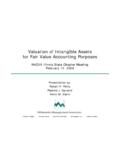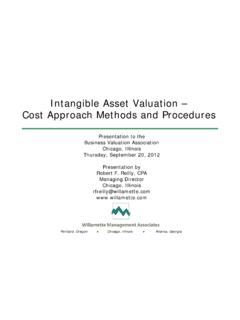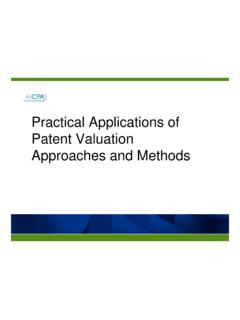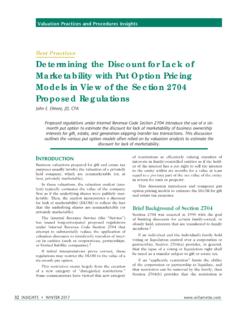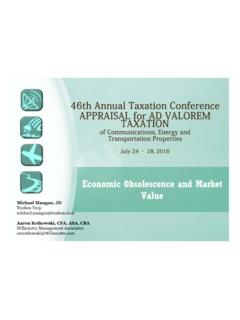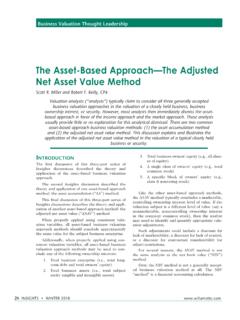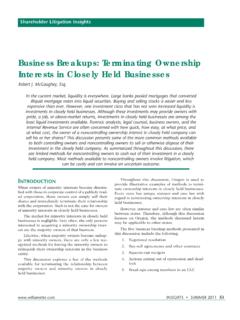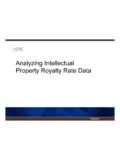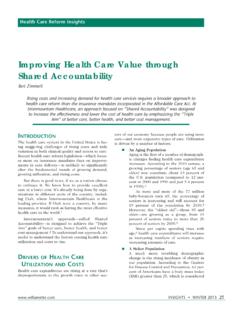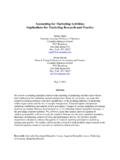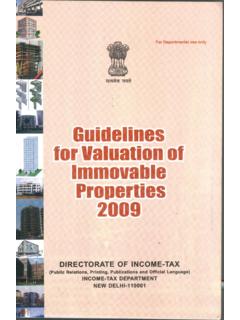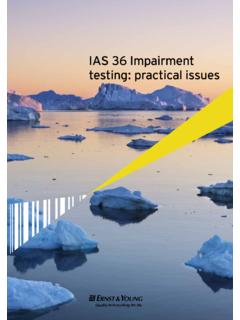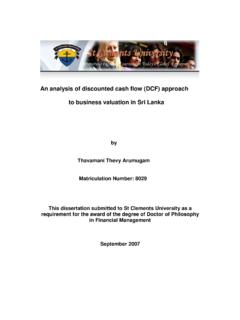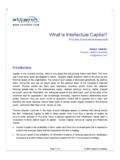Transcription of Separating IA from Real Property in RE Appraisals
1 #AICPAfvsSeparating Intangible Assets from real Property in real Estate Appraisals #AICPAfvsRobert F. Reilly, CPAR obert F. Reilly has been a managing director of Chicago-based Willamette Management Associates for the last 25 years. Willamette Management Associates is a business valuation , forensic analysis, and financial opinion services firm. Before joining Willamette, Robert was a valuation partner for the Deloitte & Touche accounting s practice focuses on the valuation of businesses, securities, and intangible assets (including intellectual Property ) for transaction, financing, taxation, accounting, controversy, and other is a certified public accountant, chartered global management accountant, certified management accountant, chartered financial analyst, enrolled agent, and accredited tax advisor.
2 He is accredited in business valuation and certified in financial forensics. He is a certified business appraiser, certified valuation analyst, certified valuation consultant, certified review appraiser, certified real estate appraiser, accredited senior appraiser, and state-certified general appraiser (in several states).Robert has served as a member of the AICPA forensic and valuation services executive committee (FVSEC), business valuation committee (BVC), and consulting services executive committee (CSEC). He is an inductee into the AICPA business valuation hall of fame. He has chaired the AICPA annual business valuation conference. And, he has twice received the AICPA volunteer of the year has co-author of 12 valuation textbooks including Guide to Intangible asset valuation (revised edition published by the AICPA in 2014) and the Practical Guide to Bankruptcy valuation (published in 2008).
3 He has authored numerous book chapters, including several chapters in the recently published Institute of Professionals in Taxation (IPT) text Property Taxation, 4thedition. He has authored over 300 articles that were published in various accounting, taxation, or valuation journals. Robert has served as an editor or editorial referee for numerous professional journals. Robert currently serves on the editorial boards for valuation Strategies, The American Bankruptcy Institute Journal, Construction Accounting and Taxation, and Financial valuation and Litigation Expert.#AICPAfvsDiscussion OutlineDiscussion premiseIdentification of intangible assetAlternative reasons to value intangible assetsIntangible asset and real estate appraisal considerationsGenerally accepted intangible asset valuation approaches and methodsIntangible asset extraction considerationsAlternative reasons to extract intangible asset value#AICPAfvsDiscussion Outline (cont.)
4 Basic Property appraisal accumulation proceduresBasic Property appraisal extracting proceduresGenerally accepted methods for intangible asset extraction from the total Property valueDirect subtraction method illustrative exampleIncome allocation method illustrative exampleRoyalty rate method illustrative exampleSummary and discussion#AICPAfvsDiscussion PremiseThe attendee has a basic familiarity with generally accepted intangible asset valuation , approaches, methods, and proceduresThe terms intangible personal Property and intangible asset are perfectly synonymous in this discussionThe word intangible is used as an adjective and not as a noun (as in intangible asset , intangible attribute, intangible influence, etc.)
5 The issue of whether or not intangible assets are included in an industrial or commercial Property real estate appraisal is specific to both the subject Property and the subject appraisal#AICPAfvsDiscussion Premise (cont.)The issue of what is (and what is not) an intangible asset is both a legal issue and an economic issue of how to extract intangible asset value from the total real estate Property value is both a legal issue and an economic the typical acquisition accounting purchase price allocation, the residual amount is the goodwill value. That formula is:Total purchase price (business value)-RE value-TPP value- Identifiable intangible asset value= Residual goodwill#AICPAfvsDiscussion Premise (cont.)
6 In the typical industrial and commercial real estate appraisal, the residual amount is the RE and TPP value. That formula is:Total real estate Property value- Identifiable intangible asset value= Residual RE and TPP value (and some goodwill)In either case, the valuation analyst values the identifiable intangible assets#AICPAfvsWhat is an Intangible asset ?It should be an asset , and it should be intangibleFASB Statement of Financial Accounting Concepts No. 6 (CON 6) provides guidance as to what is an asset It must provide probable future economic benefits The owner/operator must be able to receive the benefit and restrict others from access to the benefit The event that provides the right to receive the benefit has occurred#AICPAfvsWhat is an Intangible asset ?
7 (cont.) Intangible means something that lacks physical substance For an intangible asset , intangible means that the economic benefit of the asset does not come from its physical substance Intangible asset value is based on the rights and privileges to which it entitles the owner/operator#AICPAfvsIntangible asset AttributesAn intangible asset should have the following attributes: It is subject to a specific identification and recognizable description It is subject to legal existence and legal protection It is subject to the rights of private ownership, and that private ownership should be transferable There is some tangible evidence or manifestation of the existence of the intangible asset It is created or it comes into existence at an identifiable time or as the result of an identifiable event It is subject to being destroyed or to a termination of existence at an identifiable time or as the result of an identifiable eventThere should be a specific bundle of legal rights associated with the intangible asset #AICPAfvsWhat is Not an Intangible asset ?
8 There are intangible attributes or intangible influences that may affect the value of intangible assets or tangible assetsThese attributes or influences are not assets#AICPAfvsExamples market profitability or high profit of regulated (or protected) position (or barriers to entry) of customer Competitive edge11. Life-cycle status12. Uniqueness13. Discount prices (or full prices)14. Positive image15. First to market16. Technological superiority17. Consumer confidence or trustworthiness18. Creativity19. High growth rate20. High return on investment21. Size22. Synergies23. Economies of scale24. Efficiencies 25. LongevityWhat is Not an Intangible asset ? (cont.)#AICPAfvsReal Property Intangible AttributesThere are also intangible attributes that influence the value of industrial, commercial, residential, and mixed-use real estateThese attributes are not intangible assetsThese attributes typically cannot be separated from the value of the subject real estateExamples include:1.
9 View2. neighborhood3. proximity to transportation4. proximity to downtown5. easements, rights of way6. access7. zoning8. air, water, etc., rights9. subsurface rights10. construction, development permits11. leases, tenants12. favorable rental rates#AICPAfvsFASB ASC Topic 805 Identifiable Intangible AssetsFASB ASC 805-30-20 Glossary: Identifiable Intangible AssetsThe acquirer recognizes separately from goodwill the identifiable intangible asset acquired in a business combination. An intangible asset is identifiable if it meets either (1) the separability criterion or (2) the contractual-legal criterion described in the definition of identifiable. #AICPAfvsFASB ASC Topic 805 Identifiable Intangible Assets (cont.)
10 FASB ASC 805-30-20 Glossary: IdentifiableAn asset is identifiable if it meets either of the following criteria:1. It is separable, that is, capable of being separated or divided from the entity and sold, transferred, licensed, rented, or exchanged, either individually or together with a related contract, identifiable assets, or liability, regardless of whether the entity intends to do It arises from contractual or other legal rights, regardless of whether those rights are transferable or separable from the entity or from other rights and obligations.#AICPAfvsFASB ASC Topic 805 Identifiable Intangible Assets (cont.)FASB ASC 805-30-20 Glossary: Intangible AssetsAssets (not including financial assets) that lack physical substance.
